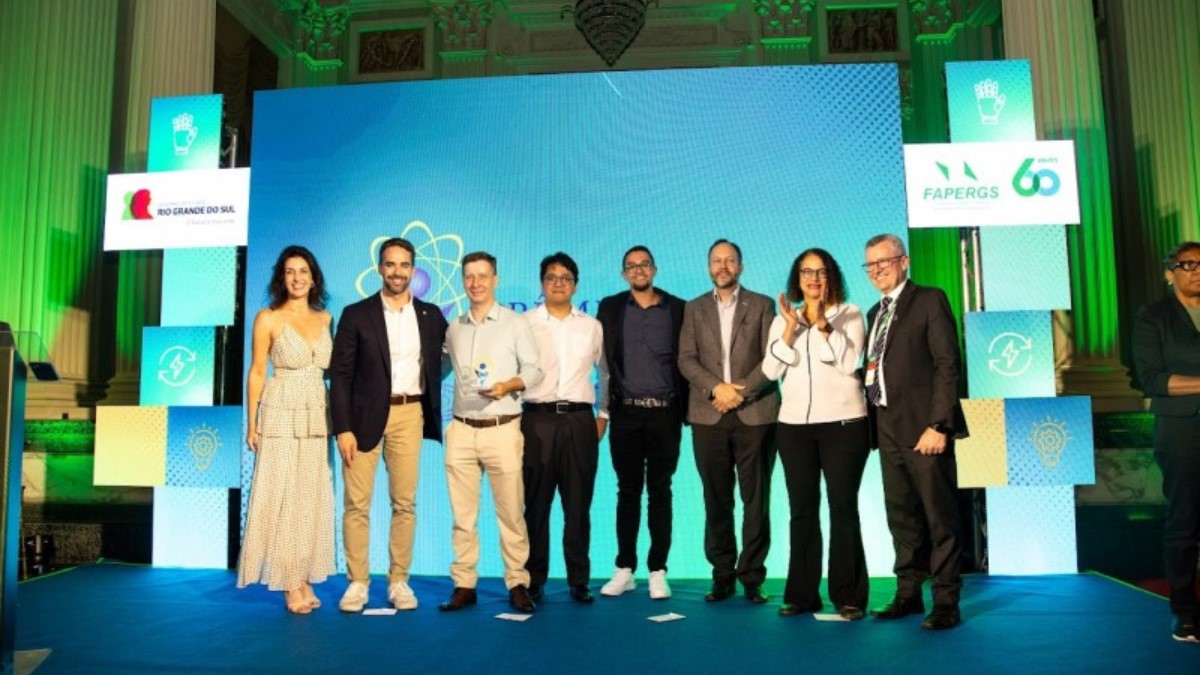TideSat was recognized as the Innovative Startup of the Year by Fapergs, standing out at the 2024 Gaucho Researcher Award ceremony, held at the Piratini Palace, with the presence of Governor Eduardo Leite and Minister Luciana Santos, from the Ministry of Science, Technology and Innovation. The award ceremony, in its 14th edition, coincided with the Foundation's 60th anniversary celebrations and honored innovative initiatives in several areas. TideSat stood out for its effective use of technology during the recent floods in Rio Grande do Sul, demonstrating a significant impact on environmental crisis management. The startup developed solutions that optimized monitoring and response to natural disasters, directly benefiting affected communities.

TideSat, a spin-off born in a laboratory at the Federal University of Rio Grande do Sul (UFRGS), is positively impacting the monitoring of water bodies such as rivers and dams. Composed of postgraduate students and a professor from UFRGS, the company has developed an innovative solution that integrates water level sensors, cloud processing and data visualization over the internet. This technology is aimed at the efficient management of water resources and flood prevention, offering a complete and low-cost system.
TideSat’s biggest differentiator lies in its water level sensor, developed in-house by the team. Using the GPS/GNSS reflectometry technique, the sensor captures the waves from GPS satellites that reflect off the water surface, allowing for accurate and safe measurements, even in adverse conditions. Unlike conventional sensors, the TideSat device can be installed in elevated locations, ensuring its continued operation during floods and greater protection against theft and vandalism.
In addition to operating autonomously with solar energy and data transmission via the Internet, the sensor is easy to install on existing structures, such as poles or buildings. This makes TideSat's solution not only innovative, but also practical and affordable.
Support for Floods in Porto Alegre and the Region
Amid the floods that devastated Rio Grande do Sul in May 2024, the TideSat startup played a key role in managing the crisis, standing out for its innovative water level monitoring technology. TideSat was responsible for the only system that remained operational during the floods in Porto Alegre, providing vital data to monitor the rising water levels in Lake Guaíba and the Jacuí River delta. With sensors installed at three strategic points in the city, the startup expanded its reach by installing, in partnership with the City of Porto Alegre, a new sensor during the flood period itself, demonstrating agility and commitment.
TideSat’s technology, based on GNSS reflectometry, uses reflections of GPS satellite waves from the water surface to accurately measure water levels, even in extreme conditions. The sensor’s ability to operate at a safe distance from the water, away from the risk of damage and theft, ensured that measurements continued reliably throughout the critical period.
At the height of the floods, TideSat’s system recorded water levels that surpassed historical levels, providing real-time information to authorities. In addition, the startup’s solution was used by the City of Rio Grande to issue its official bulletin, reinforcing the importance of technology in responding to water crises. In Estrela, as a preventive measure, TideSat installed an emergency station in June, positioning the sensor more than 20 meters above the water, after the May flood had devastated all other sensors in the region. Powered by solar energy and with data transmission via the internet, the system allowed measurements to be accessed and monitored continuously, playing an essential role in mitigating the impacts of the floods in the state.
TideSat’s trajectory is an example of how technology developed in academia can be transformed into concrete solutions for society. The initial development, carried out at UFRGS, has evolved into a robust water monitoring platform, ready to meet market demands and contribute to the sustainable management of natural resources.

















